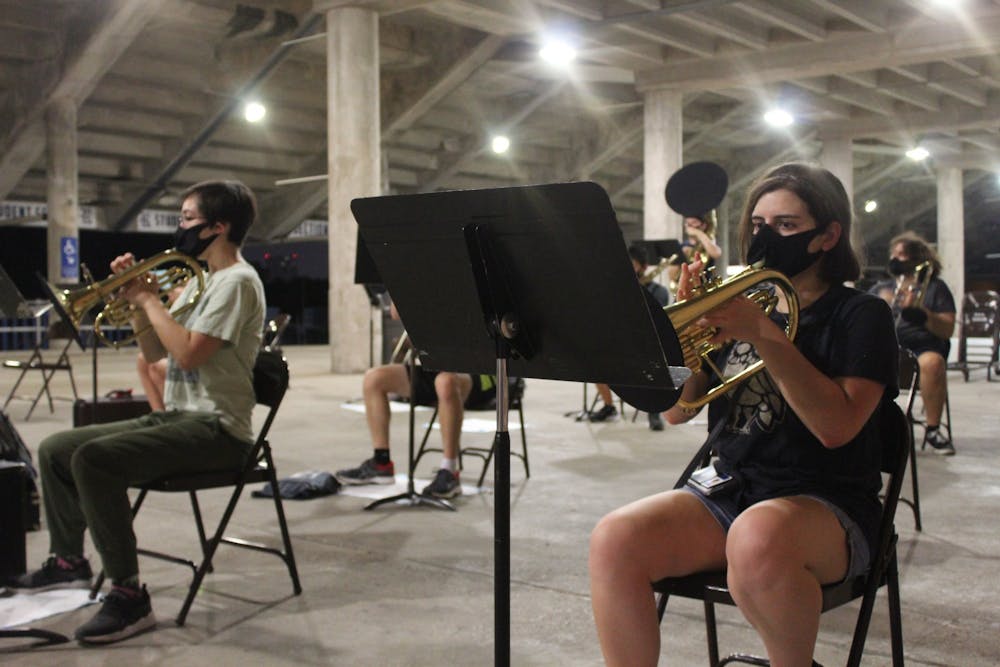Rice music thrives in the face of adversity

The Shepherd School of Music has conducted classes this semester both in-person and remote despite challenges regarding proximity, airflow, and, in the case of wind instruments, the spread of saliva particles. Consistent and exhaustive COVID-19 precautionary measures, specifically designed to restrict the spread of particles while playing instruments, have been enacted to make in-person music classes possible, according to Rice’s Director of Bands Chuck Throckmorton.
Among these restrictions include specifically designed masks for each instrument. Throckmorton said students also play as a band in thirty-minute increments and take fifteen-minute breaks to allow for airborne particles to dissipate, among other precautions.
These efforts were based on intensive scientific research by the College Band Directors National Association on how to reduce the spread of COVID-19 particles for wind instruments, according to Throckmorton. The research aims to offer scientifically backed guidelines for fully remote, mixed, and fully in-person band rehearsals in the age of COVID-19.
“We’ve gotten some preliminary results back [on the effectiveness of the COVID-19 guidelines]”, Throckmorton said. “As long as we follow some carefully designed restrictions, it’s almost indistinguishable in risk from math class.”
Madison Perry, a vocal performance major, said that her performance classes took additional cautionary measures, including standing twenty-five feet away from others while singing, extensive use of plexiglass, and specifically fitted masks for instructors.
Perry, a Martel College freshman, said that Rice’s measures aimed at reducing COVID-19 spread in music classrooms seem so effective that Perry made the decision to move in -person after one week of fully remote instruction.
“Rice has a really great informational site about their specific quarantine and isolation numbers which is updated every single day.”, Perry said. “I also loved the idea of COVID-19 testing every single week. Not every college is doing that.”
Elissa Volling, a viola performance major, said that in practice spaces, four musicians are assigned to a given room, leading to decreased contact with other Shepherd students.
“It can be challenging to find times to use that others haven’t already signed up for, but I think it’s a great way to limit contact with others and to limit the spread of airborne particles.” Volling, a Jones College freshman, said.
While a large portion of Shepherd students attend classes on campus, some students have chosen to attend classes remotely. Riley Barker, a piano performance major who is remote this semester, said he has had good experiences with learning technical music academia but has faced difficulty expressing himself artistically in a fully online setting.
“I wish I could be playing music live for other people,” Barker, a Hanszen College freshman, said. “[Being a remote musician] definitely inhibits a lot of your ability to perform as well in the very expressive and collaborative aspects of music … the effects of learning are definitely diminished by the fact that I can’t be around the students that I’m learning with.”
Barker said he thinks the creation of an online Shepherd forum by Shepherd faculty could help to better unify music students.
“[An online forum would] help foster Shepherd’s strong sense of community, regardless of all the difficult conditions,” Barker said.
Shepherd Music faculty have also cited additional difficulties in instructing music courses through an online setting. In particular, Karol Bennett, a vocal lecturer at the Shepherd School of Music, referenced frequent microphone and volume control issues as regular obstacles in an online setting.
“Using a microphone takes away from the beauty of the tone of powerful singing. [Singing loudly without a microphone] was one of those exciting moments because it just fills the room with a moving, beautiful voice and I get the benefit of that,” Bennett said.
However, Bennett said there have been some unexpected benefits of instructing over Zoom, namely as a vocal instructor.
“I can see your expressions and your mouth moving. There’s a lot that I can see [through Zoom]- if you back up, I can see your chest and how you’re breathing,” Bennett said. “I think on Zoom we really keep an intense focus.”
Annie Winkelman, an oboe performance major, said that given the circumstances, there’s not much more Rice could do to improve the situation for Shepherd musicians.
“[As a Shepherd musician] everything’s as good as I could expect it to be given the circumstances,” Winkelman, a freshman at Brown College, said. “Obviously things aren’t perfect, but given the circumstances, I can’t think of anything I would change.”
More from The Rice Thresher

Rice to support Harvard in lawsuit against research funding freeze
Rice, alongside 17 other research universities, filed an amicus curiae brief in support of Harvard University’s lawsuit against the Trump administration over more than $2 billion in frozen research grants.

Mayor Whitmire discusses ‘the state of Houston’ between audience protests at Baker Institute
John Whitmire’s remarks on the city’s budget, transportation and infrastructure were interrupted twice by shouts from audience members at a Baker Institute event May 29. At the event, which was open to the public, Whitmire spoke about the current state of Houston alongside former county judge Ed Emmett.
Rice reaffirms support for international students after Trump administration targets Harvard
Rice and the Office of International Students and Scholars said in a May 23 email that they are monitoring the Trump administration’s actions towards Harvard to bar the school from enrolling international students. A federal judge temporarily halted the move less than 24 hours later.


Please note All comments are eligible for publication by The Rice Thresher.